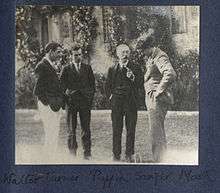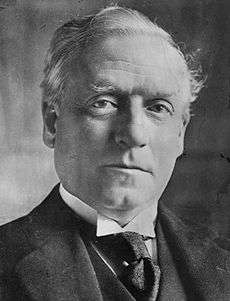Anthony Asquith
Anthony Asquith (/ˈæskwɪθ/; 9 November 1902 – 20 February 1968) was a leading English film director. He collaborated successfully with playwright Terence Rattigan on The Winslow Boy (1948) and The Browning Version (1951), among other adaptations. His other notable films include Pygmalion (1938), French Without Tears (1940), The Way to the Stars (1945) and a 1952 adaptation of Oscar Wilde's The Importance of Being Earnest.
Anthony Asquith | |
|---|---|
 Walter J. Turner, Asquith, Charles Percy Sanger and Mark Gertler, in a photo taken by Lady Ottoline Morrell | |
| Born | 9 November 1902 |
| Died | 20 February 1968 (aged 65) London, England, UK |
| Occupation | Film director |
| Years active | 1927–1964 |
| Parent(s) | |
Life and career
Born in London, he was the son of H. H. Asquith, the Prime Minister from 1908 to 1916, and Margot Asquith, who was responsible for 'Puffin' as his family nickname.[1] He was educated at Eaton House,[2] Winchester College and Balliol College, Oxford.
The film industry was viewed as disreputable when Asquith was young, and according to the actor Jonathan Cecil, a family friend, Asquith entered this profession in order to escape his background.[3] At the end of the 1920s, he began his career with the direction of four silent films, the last of which, A Cottage on Dartmoor, established his reputation with its meticulous and often emotionally moving frame composition.[1] Pygmalion (1938) was based on the George Bernard Shaw play featuring Leslie Howard and Wendy Hiller.
Asquith was a longtime friend and colleague of Terence Rattigan (they collaborated on ten films) and producer Anatole de Grunwald. His later films included Rattigan's The Winslow Boy (1948) and The Browning Version (1951), and Oscar Wilde's The Importance of Being Earnest (1952).
Asquith was an alcoholic and, according to actor Jonathan Cecil, a repressed homosexual. He died in 1968.[3] He was buried at All Saints Churchyard, Sutton Courtenay, Vale of White Horse District, Oxfordshire, England.
Filmography
Feature films
- Shooting Stars (1927)
- Underground (1928)
- The Runaway Princess (1929)
- A Cottage on Dartmoor (1929)
- Tell England (1931)
- Dance Pretty Lady (1932)
- The Lucky Number (1933)
- Letting in the Sunshine (1933)
- Unfinished Symphony (1934)
- Moscow Nights (1935)
- Pygmalion (1938)
- French Without Tears (1940)
- Freedom Radio (1941)
- Quiet Wedding (1941)
- Cottage to Let (1941)
- Uncensored (1942)
- We Dive at Dawn (1943)
- The Demi-Paradise (1943)
- Fanny by Gaslight (1944)
- The Way to the Stars (1945)
- While the Sun Shines (1947)
- The Winslow Boy (1948)
- The Woman in Question (1950)
- The Browning Version (1951)
- The Importance of Being Earnest (1952)
- The Final Test (1953)
- The Net (1953)
- The Young Lovers (1954)
- Carrington V.C. (1955)
- On Such a Night (1955)
- Orders to Kill (1958)
- The Doctor's Dilemma (1958)
- Libel (1959)
- The Millionairess (1960)
- Two Living, One Dead (1961)
- Guns of Darkness (1962)
- The V.I.P.s (1963)
- The Yellow Rolls-Royce (1965)
Short films
- The Story of Papworth (1935)[4]
- Channel Incident (1940)
- Rush Hour (1941)
- Two Fathers (1944)
References
- Anthony Asquith biography at BFI Screenonline
- "Mr T.S. Morton". The Times. 23 January 1962.
- Geoffrey Macnab "The Asquith version", The Guardian, 6 February 2003
- See also advertisement for its premiere in The Times, 14 December 1935, p. 11.
External links
| Trade union offices | ||
|---|---|---|
| Preceded by New position |
President of the Association of Cinematograph Technicians 1937–1968 |
Succeeded by George Elvin |
